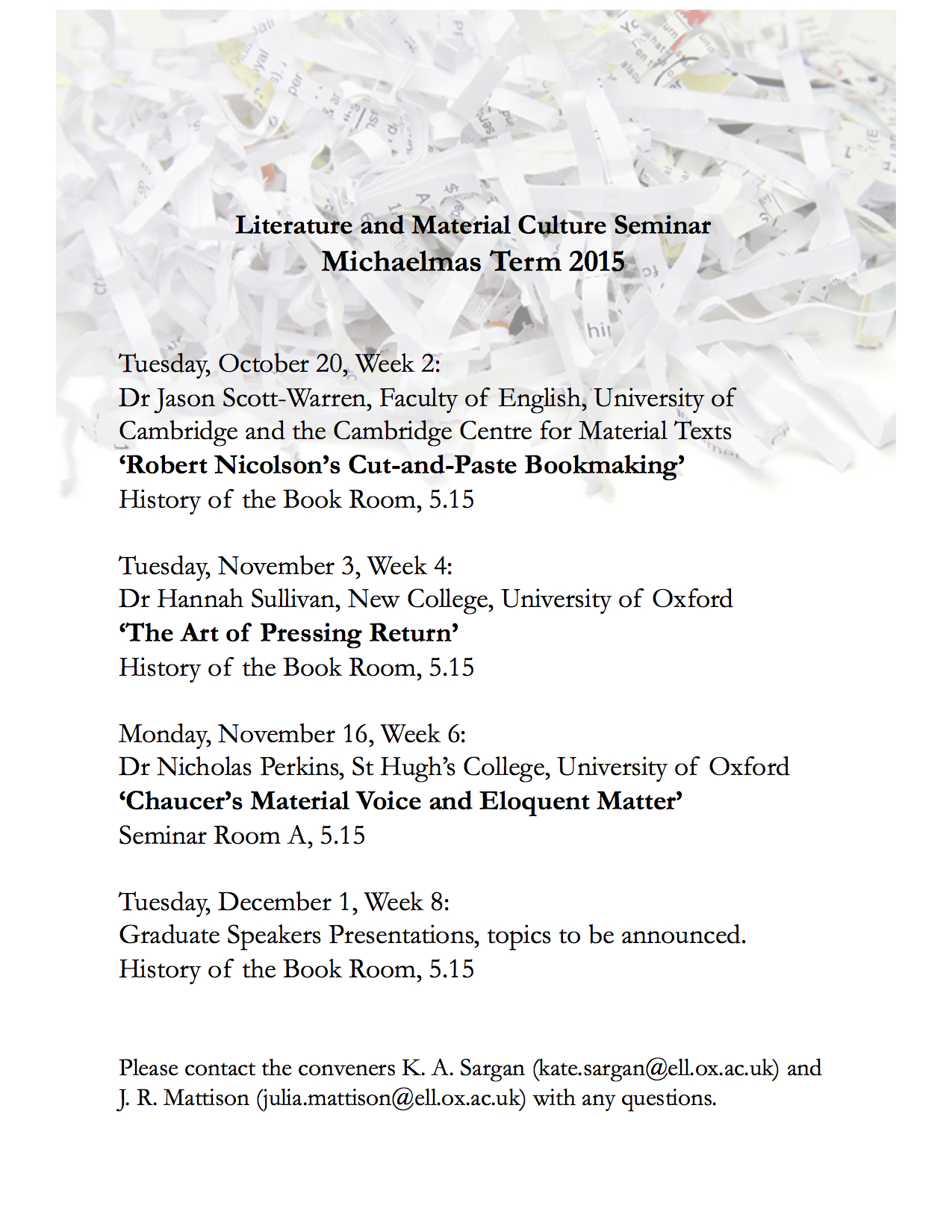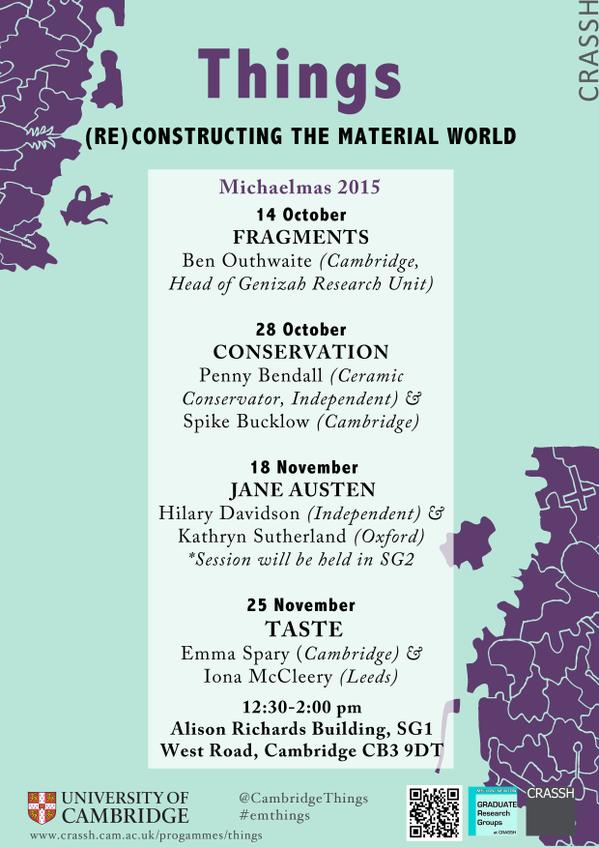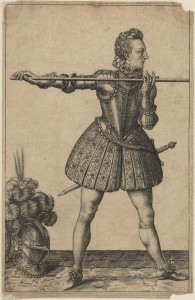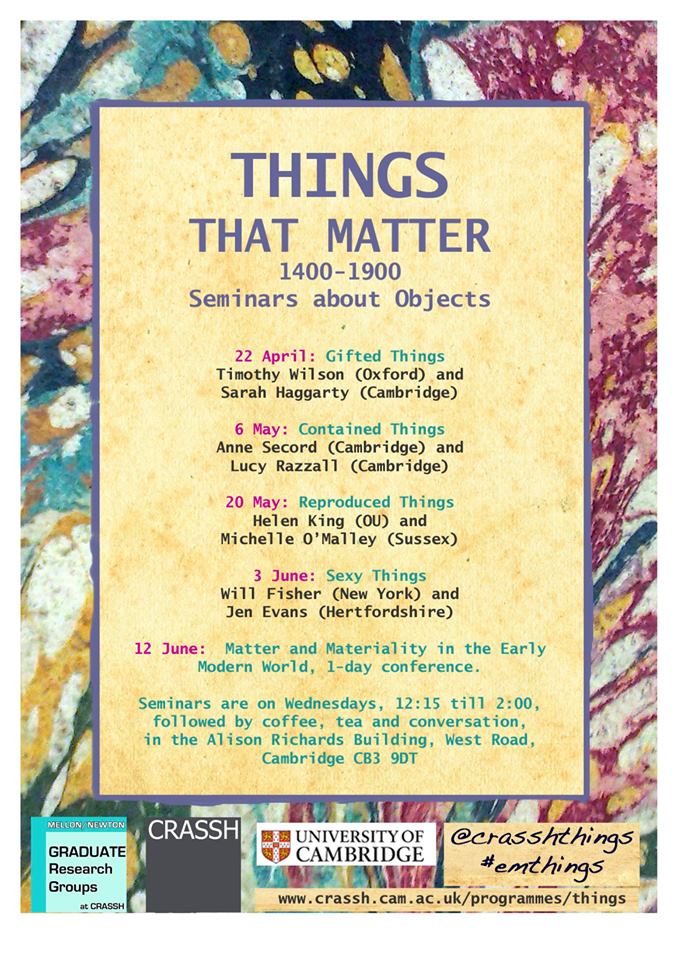Monday 18 May
Oxford Bibliographical Society 5.15pm, Taylor Institution:
Jason Scott-Warren (University of Cambridge) The Archaeology of an Elizabethan Library: Reading Richard Stonley (c. 1520-1600)
Richard Stonley, an Elizabethan exchequer official and the first documented reader of Shakespeare, left two fascinating traces in the archives. The first comprises three volumes of journals covering periods of the 1580s and 1590s; the second is a booklist that was compiled when the contents of Stonley’s house on London’s Aldersgate Street were sold off to defray his alleged embezzlements in office in 1597. This paper will dig into both documents in order to contextualize a highly distinctive early modern library.
Tuesday 19 May
Crossroads of Knowledge Reading Group 2pm-4pm English Faculty S-R19:
The reading group will be looking at Thomas Traherne, contact Tim Stuart-Buttle for more information and some pre-circulated reading material: ts630@cam.ac.uk.
Neo-Latin Reading Group King’s College London, 5.15pm B7:
Maya Feile Tomes (University of Cambridge) The shield of Aeneas in the hands of Christopher Columbus — again. New thoughts on weaponry ekphrasis in the Neo-Latin Columbus epic corpus.
The Neo-Latin subgenre of the Columbus epic – which, just as it says on the tin, is a small collection of (early modern) Neo-Latin poems on the subject of Christopher Columbus’ voyages to America – has recently increased in size from five known examples to six. By the same token, the previously known instances of the intriguing ekphrastic phenomenon that is the American shield ekphrasis (shields depicting visions or quasi-maps of the newly encountered continent), of which there were formerly thought to be just two, now find themselves joined by a third example: one which, at over 150 lines, is indeed by far the longest of them all (and, for that matter, considerably longer than the Shield of Aeneas itself!) and, in many senses, very intriguing. In my talk, I will introduce the new text and its ekphrasis, considering how its ekphrastic representation of America interacts with precedents both classical and ‘Columbian’.
Wednesday 20 May
CRASSH Things That Matter Seminar ARB SG1 from 12.15pm – 2pm: ‘Reproduced Things’
Professor Helen King (Classical Studies, Open University)
The Material Womb In the western tradition of thinking about the body, wombs have not only been illustrated in a variety of shapes, but been made in a variety of materials: ancient terracotta ‘votive wombs’ meet today’s brightly coloured, perky knitted wombs, while eighteenth-century glass wombs give way to nineteenth-century rubber wombs. In this paper, as an aspect of a wider project concerning what has been thought to constitute a body ‘part’, I will consider the colours and materials used for wombs. I shall be arguing that something more than factual knowledge guides the visual representation of the womb, and that taking the long view changes the assumptions we now make, and the questions we put to the past.
Professor Michelle O’Malley (Art History, University of Sussex)
Botticelli and Reproduction In the art historical tradition of thinking about Renaissance painting, we conceptualise pictures as ‘autograph’ and ‘workshop’, admiring the former as, say, a Botticelli, and often denigrating the latter as a slavish and dull copy. But these two strands of production were not divergent: both were outputs of the business of a master painter, and both involved, in varying degrees, the input of the master and his assistants. In this paper, I will consider the production of Botticelli’s ‘workshop’ works, drawing particularly on technical analysis to discuss approaches to the manufacture of these material objects created for the Renaissance home. I will argue that ‘workshop’ work—Botticelli’s re-produced things—represent decisions he made about manufacture in the business and that their construction calls into question some of our most fundamental tools for assessing attribution and understanding how Renaissance painters worked.
London Festival of the Arts Lecture, 5.30pm-7.30pm UCL Roberts G08:
Carole Levin (University of Nebraska) Pregnancy, False Pregnancy, and Questionable Heirs: Mary I and her Echoes
London Renaissance Seminar Room G01, 43 Gordon Square:
6pm – 7:25pm Renaissance Ways of Seeing
How did people ‘see’ in the Renaissance? In this panel discussion Joanne Anderson (Birkbeck) will ask who coloured Mary Magdalen and why it matters, looking particularly at early Renaissance artworks produced in Alpine Italy. Paul Taylor (Warburg Institute) will explore the multivalent idea of ‘imitation’ in relation to life and art in the Renaissance. Stephen Clucas (Birkbeck) will explore the visionary ‘seeing’ (or ‘skrying’) of John Dee’s angelic conversations. Gill Woods (Birkbeck) will investigate how characters went invisible on the Renaissance stage, and what that tells us about theatrical seeing.
7:40pm – 9pm Keeping it in the family: Renaissance writing dynasties?
Kingsley and Martin Amis were not the first. In the Renaissance, a remarkable number of writers (and scholars) belonged to a family double act – most often father and son, or brother and brother, but sometimes father and daughter, or mother and daughter. In a culture in which literature and learning earned new kinds of social prestige, transmitting the craft or vocation of writing from one generation to the next could help achieve social ascent. Why did people write together – was the aim to create dynasties, within which writing was a central plank? Join Professor Neil Kenny (All Souls College, Oxford) to explore how in the French and European Renaissance literature and learning did and didn’t make families a new place in the world.
Thursday 21 May
IHR: Early Modern Material Cultures Seminar 5.30pm, Seminar Room A, V&A South Kensington Research Department, Cromwell Road, London SW7 2R:
Dr Pamela Long (Independent Scholar) Engineering, Topography, and the Culture of Knowledge in Late Sixteenth-Century Rome







